Iranians Protest Against Mazut Usage In Arak

A protest was held in Arak on Tuesday against the usage of mazut in the Shazand power plant.

A protest was held in Arak on Tuesday against the usage of mazut in the Shazand power plant.
Mazut, known for its environmental hazards, is typically banned in most countries unless blended with less polluting fuels; however, in Iran, it is regularly employed due to limited export market options.
According to reports from the US-based Human Rights Activists News Agency (HRANA), government officials stepped in to ban the gathering.
Arak is one of eight major Iranian cities grappling with severe air pollution. Despite this, the authorities in the central province recently approved the re-use of mazut in the Shazand power plant, sparking concerns among the populace.
In response to the decision, several professors from Arak University issued a call to cease the use of the highly polluting fuel. In a statement, they emphasized that the burning of mazut in the Shazand power plant "poses a serious threat to the health of over a million residents of Arak and Shazand."
It was the second protest against air quality in events days. Last Tuesday, hundreds of residents in Ardakan, Yazd province, took to the streets to express their discontent with the air quality in their city.
The longstanding practice of using mazut in industries and power plants during the second half of each year, attributed to a gas shortage, has raised environmental and health concerns among the Iranian populace.
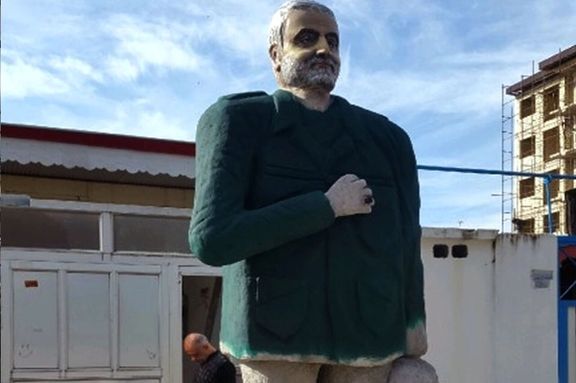
An Iranian doctor and university professor from the city of Bojnurd in the northeast was detained after posting a picture of "cutlet" on the night of the death of IRGC commander Razi Mousavi.
The action was part of a broader trend where Iranian regime opponents observed the anniversary of former IRGC commander Qassem Soleimani's killing as "Cutlet Day" on various social media platforms, referring to his mutilation in a US drone strike in 2020.
Iranian regime opponents and activists took to social media this month sending "Cutlet Day" viral, drawing a parallel to a popular Iranian dish consisting of ground beef and potatoes.
The prosecutor of Bojnourd confirmed the arrest, stating that "insulting the martyrs is considered an insult to sanctities," the two top military men deified by the regime since their deaths. Like Soleimani, Mousavi, reportedly killed in an Israeli airstrike in Syria, played a pivotal role in fortifying Iran's proxy forces in the region.
The arrest aligns with a pattern of Iranian authorities cracking down on dissent. Earlier in January, a prominent chef and Instagram influencer, Navab Ebrahimi, faced detention for sharing a Persian cutlet recipe on the anniversary of Soleimani's death. Ebrahimi was released on bail after a few days, though the specific charges against him remained unclear.
The Iranian government's intensified response to dissent is evident, particularly in the aftermath of the September 2022 death in police custody of 22-year-old Mahsa Amini. Amini was arrested for allegedly improperly wearing a headscarf, fueling nationwide anger and prompting increased measures to suppress signs of dissent across the country amid mass protests.
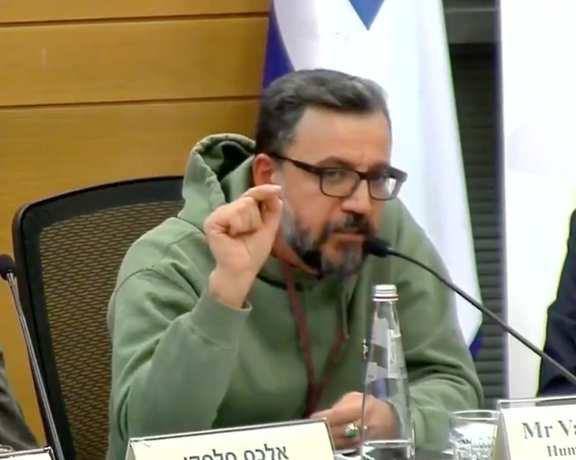
In a message to Israel's parliament on Tuesday, Iranian opposition figure Vahid Beheshti urged Israel to target Iran directly amid the regime's proxy war raging in the region.
Beheshti, known for his recent hunger strike in London in a bid to pressure the UK government to designate Iran's Revolutionary Guard Corps, said direct action is "the only language they understand”.
“Help us overthrow the government. Try to imagine what the Middle East would look like without the Iranian government,” he urged.
Speaking before the Israel Victory Caucus, which consists of Knesset members, security experts, and political leaders, Beheshti highlighted the pressing challenge to regional security posed by Iran, which last month was exposed for rapidly progressing its enrichment in the race towards nuclear weapons.
Since October 7 when Iran-backed Hamas invaded Israel, killing 1,200 mostly civilians and taking 240 or more hostage, attacks on both Israel and US facilities in the region have spiked. Iranian proxies in Yemen, Lebanon, Iraq and Syria have been activated triggering the worst crisis in recent years.
Israeli Prime Minister Benjamin Netanyahu repeated his calls this week to ensure Iran does not achieve nuclear capabilities while the country continues to fight Hamas in Gaza. Israeli strikes on Iranian linked facilities in the region also continue alongside the war against Hamas, including an alleged assassination of the regime's most senior military figure in Syria.
Beheshti said the Iranian government is at its weakest in 44 years in the wake of the 2022 uprising which has seen the strongest resistance to the government since the foundation of the Islamic Republic in 1979.
He urged Israel to recognize the potential support from approximately 80 million Iranians yearning for freedom and democracy.
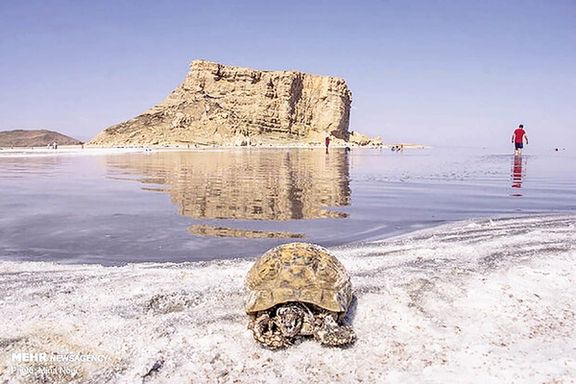
Iran’s Environment Department has denied any involvement of the Chinese in lithium extraction from Lake Urmia.
This follows the circulation of images on social media depicting trucks on the desiccated lakebed. The Director of Environmental Protection in West Azarbaijan, Saeed Shahand, has claimed that the activities in question solely pertain to “salt extraction, not lithium.”
Earlier reports had said that Chinese companies were acquiring brine from Lake Urmia with the aim of obtaining valuable lithium, which can be used to support the country’s nuclear program.
However, officials allege that the lake lacks lithium, underscoring the ongoing authorized extraction of salt from specific areas.
Shahand affirmed that the extraction of salt from Lake Urmia has been a long-standing practice, spanning years, claiming that it has not led to any adverse environmental consequences in authorized areas.
Researchers have sounded a cautionary note, warning about the potential repercussions of salt extraction and disturbance to the lakebed. Pertinent questions have been raised regarding research into the impact of salt compounds in Lake Urmia on plants, humans, and agricultural fields.
The ongoing drying of Lake Urmia, once the region’s largest lake, is causing growing concern among environmental experts who fear its far-reaching effects on various regions of Iran in terms of both environmental and human impacts.
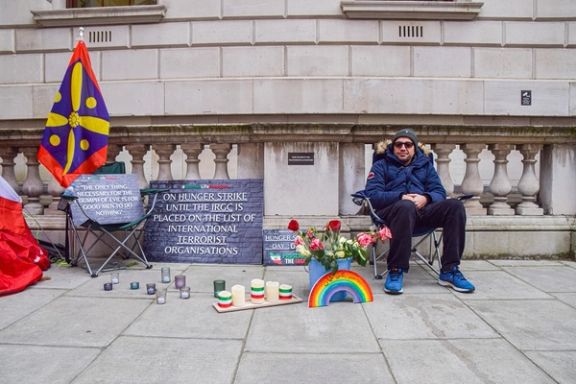
Iranian opposition figure and activist Vahid Beheshti is slated to arrive in Israel to express his support for the Jewish state at the Knesset on Tuesday.
Beheshti, an independent journalist and Iranian human rights activist based in London, recently concluded a 72-day hunger strike, followed by a sit-in last month. His protest aimed to persuade the British government to designate Iran's Islamic Revolutionary Guards Corps as a terrorist organization, serving also as a demonstration against the regime.
Participating as a speaker in the Knesset Israel Victory Caucus (KIVC), Beheshti will explore the question of what Israel's victory will resemble at the conclusion of the war, the Israel Victory Project announced in a press statement released on Monday. The conference, led by MK Ohad Tal of the Religious Zionist Party and Yifat Shasha-Biton of National Unity in collaboration with the Israel Victory Project, will bring together members from both the coalition and the opposition.
The Israel Victory Project, which seeks to guide US and Israeli policy towards supporting an Israeli victory over the Palestinians to resolve the Arab-Israeli conflict, underlines its mission to safeguard Western values from "Middle Eastern threats."
Beheshti's visit aims to convey support for Israel on behalf of the Iranian people and advocate for the Jewish state to shift its attention to the Iranian regime rather than just its proxy arms, including terror organizations like Hamas, Hezbollah, and the Houthis.
The visit follows last year's historic visit of exiled Prince Reza Pahlavi who visited Israel to show support to the Jewish state.
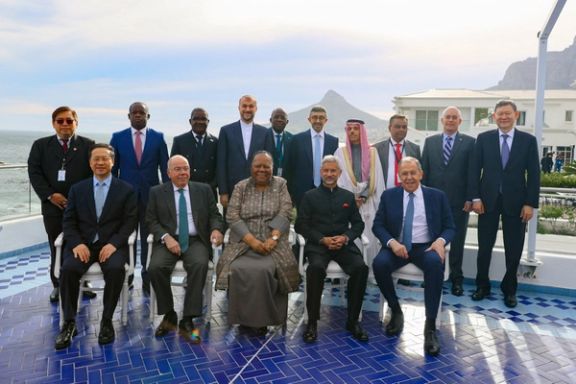
Iran officially became a member of the China-led BRICS economic organization on Monday, as it seeks to overcome the impact of US sanctions and overcome it isolation.
In its policy of finding shelter under Chinese and Russian-dominated international organizations, Iran achieved full membership in the Shanghai Cooperation Organization in July 2022 and concurrently pursued entry into the BRICS group. Following an official invitation, Iran announced its acceptance into BRICS on August 24, 2023, with the official membership commencing on January 1, 2024.
Iran's Foreign Ministry spokesman, Nasser Kanaani, announced the news on Monday as an important achievement for Tehran, emphasizing the potential for economic potential BRICS can offer. Ehsan Khandouzi, Iran's Finance and Economic Affairs Minister, expressed hope for global engagement and for increased trade opportunities with BRICS countries, despite US sanctions.
Iranian officials, who feel the need to calm domestic anxieties about the economic crisis gripping the country since 2018, routinely tell citizens that BRICS could challenge the dominance of the US dollar, and alleviate the financial crisis brought about by the US sanctions. Despite these assertions, domestic markets know that the Chinese themselves heavily rely on the US dollar for trade. Lack of confidence in the foreign and economic policies of the government has played a major role in the 12-fold devaluation of the Iranian rial against major currencies since 2018.
In Iran’s domestic political dynamics, BRICS is presented as a mechanism and an opportunity to challenge the United States and boost trade.
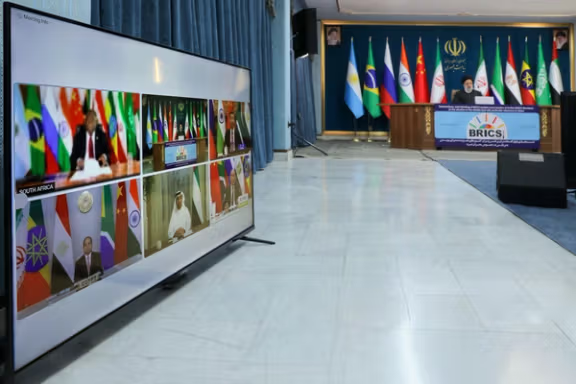
Despite these perspectives, skepticism remains about the practical benefits of Iran's BRICS membership, especially concerning economic implications. Geopolitical tensions, such as Russia's invasion of Ukraine and China's strained relations with the United States, complicate BRICS' role as a counterweight to the West.
During the BRICS summit in August 2023, Iranian President Ebrahim Raisi and Chinese President Xi Jinping emphasized bilateral cooperation and opposition to “American unilateralism.” While some individuals are optimistic, Tehran observers doubt practical benefits, emphasizing the need to address relations with the US and resolve the dispute about Iran’s nuclear program for meaningful membership impact. Former UN diplomat Kourosh Ahmadi has warned against illusions about potential benefits from SCO and BRICS, suggesting such beliefs could be more harmful than not being members at all.
Challenges
Not all BRICS members may be equally enthusiastic about Iran's inclusion, and not every existing member supported Iran's decision to join. Additionally, the impact of US secondary sanctions, restricting Iran's global business activities, may not be substantially alleviated by BRICS participation, especially given the organization's alignment with China and Russia, both with their own serious economic challenges and disputes with the West.
Nevertheless, Iran's energy sector is expected to experience significant changes with BRICS membership, particularly due to its major role in gas and oil production. Joining BRICS is seen as a strategic move to enhance energy trade and collaboration, especially with China and Russia. Anticipated benefits for Iran include increased energy exports, investment in energy infrastructure, and potential relief from US sanctions through the use of national currencies in energy trading.
While Iran aims to leverage BRICS membership to weaken sanctions, boost its economy, and access broader markets, experts caution that economic gains may be limited without a nuclear deal with the West. The uncertainties about the effectiveness and cohesion of BRICS policies also raise questions about the immediate and long-term benefits of Iran's membership.
Financial Action Task Force (FATF)
The Financial Action Task Force (FATF), a global monitor on money laundering, announced on Friday that it has made no modifications to its blacklist, which includes Iran, Myanmar, and North Korea. Iranian economist Mohammad Mehdi Behkish has emphasized potential difficulties in business transactions with BRICS countries if the FATF issue is not resolved. He has also underscored that, despite additional countries joining BRICS, the economic significance of the United States to China will surpass that of all BRICS nations, emphasizing the necessity of easing financial restrictions for Iran to fully benefit from BRICS membership.
It is claimed that Iran's membership in BRICS represents a strategic alliance with China and Russia, with opportunities for enhanced infrastructure investment and commerce. The goal to change the dynamics of the global energy market and lessen reliance on the US currency in energy-related transactions is supported by China and Russia. Higher energy exports and the possible use of national currencies as a hedge against US sanctions are anticipated benefits. However, Iran or any other country, needs revenues in hard currencies for most imports, and replacing the US dollar in energy exports does not seem to be a wise policy.
Moreover, considering the significant trade volumes they maintain with the United States, some BRICS members would be reluctant to take on economic risks in their dealings with Iran. This complicated situation highlights the numerous difficulties and factors that go along with Iran's involvement in BRICS, calling for a systematic and careful strategy to deal with these complications.